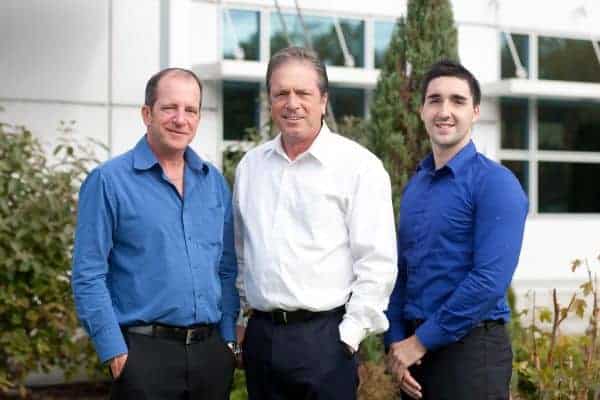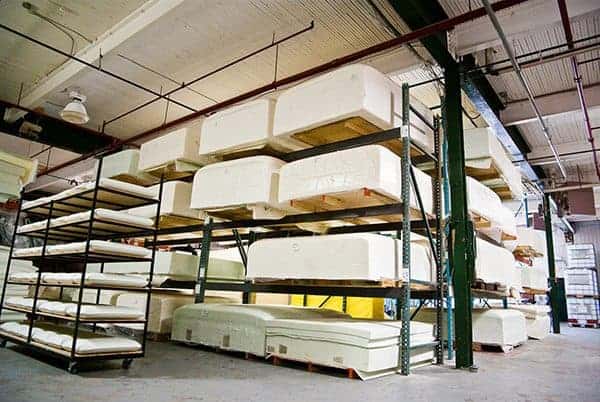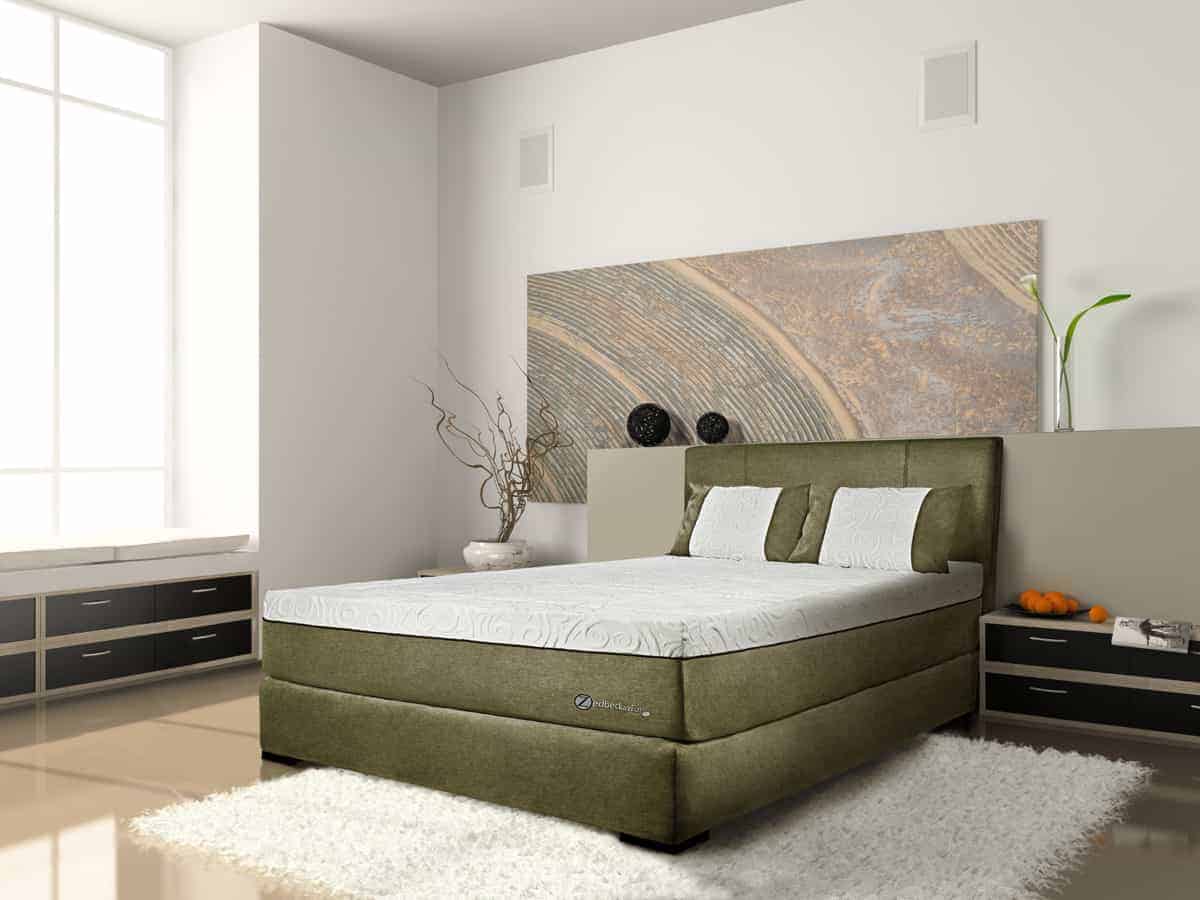After establishing its brand and cementing its retail base in the Canadian province of Quebec, bedding manufacturer Zedbed wants to become a national player throughout its home country and a recognized name in the United States.
To accomplish that, Zedbed has begun a process of methodical growth based on innovation and a strong relationship with dealers.
A start in springs
Zedbed was founded as Literies Champlain in 1994 by brothers Alain, Denis and Mario Gélinas. Today, Alain Gélinas serves as the company’s vice president and Mario Gélinas as president. Denis Gélinas died three years ago, about the same time his son, David, joined Zedbed as director of marketing.

Zedbed is run by Alain Gélinas, (from left) vice president; Mario Gélinas, president; and David Gélinas, director of marketing.
Make-their-own memory foam
During its first seven years, the company focused on innerspring mattresses and box springs, adding adjustable bases imported from Europe in 1998. When the popularity of its adjustables began to grow, Literies Champlain started production of a higher-end version, as well.
To further enhance adjustable sales, in 2000, the company began to offer the bases in sets that included memory foam mattresses. That decision quickly transformed the young business.
“In 2001, we stopped producing spring mattresses and began focusing on producing memory foam mattresses from components bought from others,” David Gélinas says. “We saw a big opportunity in memory foam. There are many spring manufacturers in Quebec, but 10 years ago, Tempur-Pedic was our only memory foam competition and it wasn’t a big player in the province.”
The shift in product orientation was so dramatic, the founders decided the company’s name needed a change, too. So, Literies Champlain became Zedbed, a name the company principals felt reflected their bold new direction.
David Gélinas estimates that about 35% of mattresses sold in the province of Quebec today are made from visco-elastic foam or latex. He credits Zedbed with spurring demand for memory foam mattresses and says the company was instrumental in creating the specialty bedding market in the province.
Zedbed is one of the few specialty mattress manufacturers to pour its own foam. The company’s commitment to innovation and quality drove the decision.
“Eight years ago, we were a small buyer and couldn’t get good pricing. We also knew that the demand for memory foam was growing and we wanted to be able to control quality and offer something different from everyone else. So, in 2004, we began producing our own memory foam,” David Gélinas says.
There has been a steady stream of innovative foam products from Zedbed ever since. In 2006, the company created ZedPur Enviro, a high-density, slow-response memory foam that contains about 20% soybean oil.
In 2008, Zedbed introduced ZX, an “instant-response” hybrid memory foam that has a comfort level between latex and memory foam. Zedbed’s most recent introductions include a slow-response, soy-based foam with gel crystals and another memory foam that incorporates coconut oil to create what David Gélinas calls “a luxurious feel.”

Zedbed produces foam mattresses in a 25,000-square-foot facility. It also has plants for making pillows and adjustable bases.
The Zedbed line
Zedbed has built strong relationships with its retail base in the province of Quebec. It has exclusive agreements with the BMTC Group and Matelas Bonheur. BMTC Group owns and operates two chains of full-line home stores—Brault & Martineau with 16 locations and Tanguay with nine. It’s the largest chain store in Quebec and the third largest in Canada. Sleep shop chain Matelas Bonheur has 17 stores.
In Quebec, Zedbed gives retailers a choice of 30 mattress models.
“We want to be able to offer exclusive models to each retailer,” David Gélinas says.
The entry-level bed offered in Canada is 9 ½ inches thick and has a suggested retail price of about $1,500 (U.S.) in queen size. It features a 2-inch memory foam comfort layer atop 3 inches of support foam and a 4-inch base layer of ventilating channeled foam.
The company’s top bed in Canada has a suggested retail of about $2,600 (U.S.). It includes 4 inches of memory foam (manufactured using a proprietary mix of soy and coconut oil) atop 2 inches of latex and 2 ½ inches of Celcar foam within the company’s Airflo system in the comfort and support layers. The base layer is 3 ½ inches of soy-based foam plus 2 inches of extra-firm Celcar base foam.
“In total, the 14-inch mattress features 19 ventilation channels and seven zones of comfort to help with both proper alignment and cooling to give a restful night’s sleep,” David Gélinas says.
All Zedbed products are manufactured at three facilities in Shawinigan, Quebec, which is about 75 miles northeast of Montreal. Mattresses are produced in a 25,000-square-foot facility the company purchased two years ago. Zedbed’s original 15,000-square-foot plant is now used for pouring foam and manufacturing pillows, which the company offers in all foam types. Adjustable bases are produced nearby in a 2,000-square-foot facility.
Zedbed makes considerable effort to be an eco-friendly company. It strives to buy all materials within 50 miles of its facilities, controls emissions within and from its plants, and uses only natural or organic materials when possible.
Zedbed actively seeks relationships with suppliers who have made the same commitments. It doesn’t, however, sacrifice the quality of its products just for the sake of making a “green” statement.
“Most of our customers aren’t after the most eco-friendly mattress,” David Gélinas says. “They’re after the most comfortable and durable one.”

‘We follow Steve Jobs’ model at Apple,’ David Gélinas says. ‘We need to cover the mattresses with something, so why not cover them with something attractive?’
Extending its reach
Zedbed entered the U.S. market just two years ago and expanded into the Canadian provinces of New Brunswick and Ontario at about that same time. The company is exploring different channels of distribution in those markets and has tailored its product offerings.
In the United States, the company is putting its efforts into opening accounts in all states east of the Mississippi River. Pat Alisson, director of sales for the United States, is charged with accomplishing that.
“When I joined Zedbed two years ago, we had two U.S. sales reps and a handful of accounts. Now, we have 10 reps and about 25 accounts,” Alisson says. “We’re pursuing independent furniture retailers, top 100 retailers, small- to medium-size bedding chains and independent sleep shops.”
The company also is configuring its product offerings differently in the United States. The lineup has been simplified to four main collections. Beds within each collection are offered at “good-better-best” price levels, based on the thickness of the mattress and the combination of foams used inside. “Good” beds with a 9 ½-inch queen size mattress start at $1,699. A 14-inch “best” mattress made with Zedbed’s ZX hybrid foam is about $2,699 in queen size.
The company goes to great lengths to make sure that its beds stand out on retail floors.
“We have microfiber fabrics on the foundation and sides of the mattress and sew the ticking to the top 2 inches of the comfort layer,” Alisson says. “Everything looks very crisp.”
“We follow the Steve Jobs’ model at Apple,” David Gélinas says. “We need to cover the mattresses with something, so why not cover them with something attractive? Sometimes customers stop at Zedbed displays just because they’re beautiful.”
Zedbed’s commitment to high quality and high style has served it well. Annual sales in 2011 approached $10 million (U.S.), a 15% increase over the previous year. Sales from the United States and the company’s new Canadian markets outside Quebec contributed about 5% each to that total. David Gélinas expects each of those regions to account for about 20% of annual sales within five years. If the company reaches that goal, he says, total Zedbed sales should continue to grow by 15% annually.
As for any company, there are challenges. For one thing, U.S. retailers can be reluctant to put a brand on their floors that doesn’t have widespread name recognition.
“Some ask how they can sell us if we’re not a big brand,” Alisson says. “We are a well-known brand in Quebec and once we get enough U.S. retailers, we can do the same extensive marketing in the U.S. as we do there. Zedbed co-sponsors the highest-viewed reality TV show in Quebec. Billboards and truck skins make us very visible throughout the province.”
Meanwhile, Zedbed is offering U.S. retailers a coop-advertising program and extensive point-of-purchase materials.
And the company continues to rely on innovation to propel it toward its goals. It plans to launch several new products at the April High Point Market in High Point, N.C. New offerings will include an ergonomic base foam system and a foam made with a higher concentration of coconut oil. Zedbed, which regularly shows at the High Point and Toronto markets, expects to begin showing at the Las Vegas Market in 2013.
Executives don’t seem daunted by the challenges.
David Gélinas says: “We are a very strong family company and will succeed by staying close to our founding values of innovation and quality.”
| BRIEFLY | |
| Company | Zedbed |
| Specialty | Visco-elastic mattresses made with the company’s own proprietary memory foams, as well as latex mattresses and adjustables bases |
| Headquarters | Shawinigan, Quebec, Canada |
| Founding Date | 1994 |
| Ownership | Privately held, family-owned |
| Learn more | http://www.zedbed.com |




